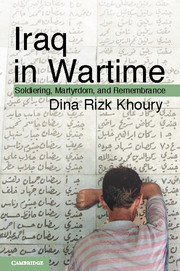Book contents
- Frontmatter
- Contents
- List of Illustrations, Maps, and Table
- Acknowledgments
- Note on Translations and Transliteration
- Maps
- 1 Introduction
- 2 Iraq’s Wars under the Ba‘th
- 3 The Internal Front
- 4 Battlefronts
- 5 Things Fall Apart
- 6 War’s Citizens, War’s Families
- 7 Memory for the Future
- 8 Commemorating the Dead
- 9 Postscript
- Appendix I Distribution in Percentage of Ba‘th Party Members, “Friends of Saddam,” and Martyrs in Fifteen Iraqi Provinces, 1998–1999
- Appendix II Percentage of Ba‘th Party Membership among Matriculating Students (Sixth Secondary) in Ten Iraqi Provinces, 1987–1988
- Appendix III Report Issued by Ali Hasan al-Majid, Head of the Northern Bureau of the Ba‘th Party to the General Secretariat, August 1987
- Sources and Bibliography
- Index
3 - The Internal Front
Making War Routine
Published online by Cambridge University Press: 05 March 2013
- Frontmatter
- Contents
- List of Illustrations, Maps, and Table
- Acknowledgments
- Note on Translations and Transliteration
- Maps
- 1 Introduction
- 2 Iraq’s Wars under the Ba‘th
- 3 The Internal Front
- 4 Battlefronts
- 5 Things Fall Apart
- 6 War’s Citizens, War’s Families
- 7 Memory for the Future
- 8 Commemorating the Dead
- 9 Postscript
- Appendix I Distribution in Percentage of Ba‘th Party Members, “Friends of Saddam,” and Martyrs in Fifteen Iraqi Provinces, 1998–1999
- Appendix II Percentage of Ba‘th Party Membership among Matriculating Students (Sixth Secondary) in Ten Iraqi Provinces, 1987–1988
- Appendix III Report Issued by Ali Hasan al-Majid, Head of the Northern Bureau of the Ba‘th Party to the General Secretariat, August 1987
- Sources and Bibliography
- Index
Summary
I thought when the [Iran-Iraq] war started that it will end in a month, then two months, then three. Then I was convinced that it would end before I am graduated from college. But when I became a soldier [1984], I thought the war will never end.
Tareq Ali, a Baghdadi from a middle-class family, describes how he learned to live his life with war. His statement underscores the success of the government and the ruling Ba‘th Party in normalizing the Iran-Iraq war and making it part of the everyday life of citizens. How was the government able to turn what should have been a short exceptional interlude into an enduring reality? What were the mechanisms of ensuring the public’s obedience and support? How were the war’s social costs managed at home? What sort of disciplinary and bureaucratic practices developed to ensure the continuous circulation of men to the front?
Partial answers to these questions lay in the regime’s ability to transform war into a way of governing – a set of techniques to educate, reward, discipline, count, and survey its population on what it dubbed the “internal” front. The Ba‘th Party was central to this project. It is important not to view the process of turning war into part of everyday life as simply a product of directives of an authoritarian regime foisted on a passive population. What emerges from examining the workings of the Ba‘th Party is a process more complex and dynamic. On one hand, the Ba‘th Party was instrumental in securing citizens’ obedience through monitoring dissent and ensuring the dissemination of the sanctioned version of the war story. On the other hand, the Ba‘th Party acted as a social organization, ensuring that the impact of the war was borne by the population and effecting the social policy that governed the day-to-day lives of Iraqis.
- Type
- Chapter
- Information
- Iraq in WartimeSoldiering, Martyrdom, and Remembrance, pp. 48 - 81Publisher: Cambridge University PressPrint publication year: 2013

